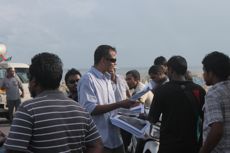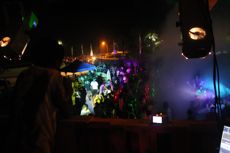The Family Court has assigned foster parents to a 10-month-old baby for the first time in Maldivian history. The child, who had been abandoned, was transferred from state care to a married couple on Sunday, September 18.
“This is the first time that non-biological parents have been given legal guardianship of a child in the Maldives,” said Ilham Mohamed, a local NGO worker familiar with the matter.
Mohamed said that foster parents previously risked the biological parents turning up to demand money and/or the child. “This example will make the process more secure,” she said.
The new foster parents will have the same legal rights given in adoption, except for the rights to consent to marriage and leave an inheritance.
Mohamed pointed out that in many cases where a father will not consent to his daughter’s marriage, the young couple requests and often receives court permission. She said the process usually takes between two and three months.
The couple’s lawyer, former Attorney General (AG) Aishath Azima Shakoor, told local media that the couple wanted to opt for their new daughter to inherit an equal share of their property. According to Mohamed, Maldivian law allows foster parents this option.
Shakoor recently told local media that the court had transferred the state’s legal guardianship of the child under Shari’a law to the couple, who have agreed in writing to protect and provide for the girl.
The Maldives did not provide services for abandoned children before the 1990s. Sources say that the number of abandoned children rose during that decade, possibly due to the allegedly higher rate of drug use among young adults at that time.
In 1992, the Ministry of Gender and Family established the Unit for the Rights of the Child (URC), now known as the Child and Family Protection Services (CFPS). Since then, the ministry maintains that the number of care-giving staff and institutions are unable to meet demand.
An Auditor General’s report dated 2009 reported 43 children at the state’s orphanage on Villingili, near Male. The report noted that the orphanage was understaffed and staff members were unable to provide sufficient care for children below the age of five. Most employees were not trained in child psychology, and there were no provisions for medical emergencies.
The orphanage on Male is currently over capacity and children are not segregated by age, said Mohamed.
Minivan News previously reported that Maldivian Family Law requires various next-of-kin be asked to care for abandoned children before the state assumes responsibility. But the process of identifying proper care-givers was reported long and difficult, and the Ministry of Family and Gender was regularly backed up with applications at the time.
The report also noted that adoption, as it is handled in the West, is illegal in Islam.
“Adoption in the Western style is not part of Islam,” explained Mohamed. “But fostering, or taking people into your care, is part of Islamic culture. It doesn’t really matter what name you use, foster or adopt, just so long as children have a safe place to live.”
Mohamed said she believes most orphanages have wait lists, and expects foster parenting to increase significantly.
“The couple that has been approved struggled to convince local authorities of their case. But now that this has been done once, it won’t be difficult for people to do it again.”
Mohamed noted that the struggle to legalize foster parenting began in the late 1990s, and calls the recent case a “very significant event.”



